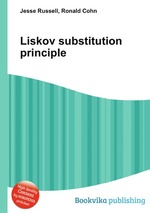Liskov substitution principle
Jesse Russell Ronald Cohn
бумажная книга
High Quality Content by WIKIPEDIA articles! Substitutability is a principle in object-oriented programming. It states that, in a computer program, if S is a subtype of T, then objects of type T may be replaced with objects of type S (i.e., objects of type S may be substitutes for objects of type T) without altering any of the desirable properties of that program (correctness, task performed, etc.). More formally, the Liskov substitution principle (LSP) is a particular definition of a subtyping relation, called (strong) behavioral subtyping, that was initially introduced by Barbara Liskov in a 1987 conference keynote address entitled Data abstraction and hierarchy. It is a semantic rather than merely syntactic relation because it intends to guarantee semantic interoperability of types in a hierarchy, object types in particular. Liskov and Jeannette Wing formulated the principle succinctly in a 1994 paper as follows:


